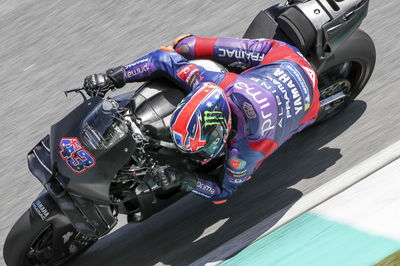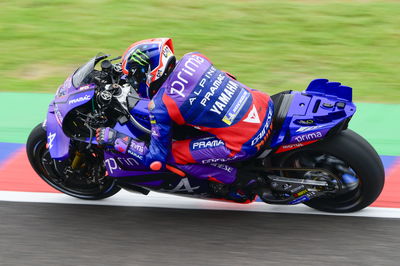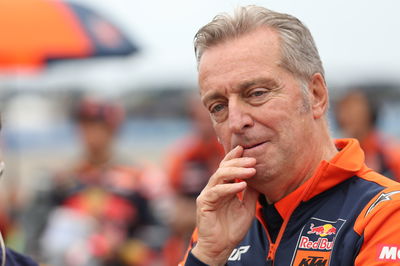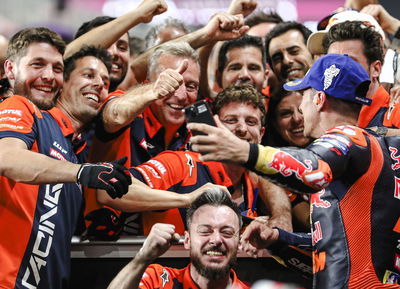Rare info on MotoGP rider finances revealed: “There needs to be a minimum sign-on”
Money "isn’t what it used to be" as numbers are explained

Details about MotoGP rider pay has been shared, in a rare disclosure of how much money they really pocket.
Information about the salaries and bonuses of MotoGP riders is extremely scarce.
Yamaha’s Fabio Quartararo is reportedly the highest-paid on the current grid at €12m per season, while Marc Marquez supposedly walked away from Honda’s offer of €25m per season to join Ducati.
But the numbers at the back end of the grid are less clear, and Pramac Yamaha’s Jack Miller has now spoken about the need for a minimum sign-on package for rookies.
“It has been a talking point for us, as riders. Marc Marquez has spoken on it. Many guys have spoken,” Miller told the Gypsy Tales podcast.
“There needs to be, at least, a minimum sign-on.
“Some of these guys are signing on for next to nothing.”
Miller was asked what the lowest sign-up deal might be for a MotoGP rookie.
“Probably 60,000. I swear to you,” he said.
Miller was talking on an Australian podcast so it seems he means 60,000 Australian dollars - equivalent to approximately £28,000 or $36,000. It was unconfirmed which currency he was discussing but it still provides an insight into the numbers on offer.
Miller explained how money from elsewhere would boost a rider’s bank balance.
“You might make up [the sign-on money]. If you’re signing up as a rookie, you are not guaranteed bonuses,” he said.
“But you will probably get, as a top-level Moto2 rider, 100,000 or 150,000. But your leather deal, your helmet deal, will make up for it. It will be better.
“But it isn’t what it used to be.”
Gone are the days when MotoGP superstars like Valentino Rossi and Jorge Lorenzo were recruited on mega-million-dollar deals.
Miller insists that the dominance of manufacturers and their individual bikes has lowered the market value of the riders themselves.
He claims that the money on offer when he started in MotoGP was better.
“When I came in, the solid base salary was around 250,000,” he said.
“But it’s not all roses. When I came in, there were still guys paying for rides in MotoGP. “We don’t have that now. It’s gone, which is fantastic. It’s better.”

Jack Miller: MotoGP “not only a full-time job”
The Pramac rider insisted that the incredible demands of being a MotoGP rider deserve a greater reward.
“It’s not only a full-time job, it’s a life,” he said.
“Every day that you’re not on the bike, you’re busting your arse in the gym, busting your arse training.
“Doing all of these little 1% increments to make yourself better.
“I believe, if you are risking your longevity, your body is never going to be the same.
“Don’t get me wrong - it’s a fantastic job and I’d do it for free, because I love it. But you are putting on a show for everybody, doing these great things, and you should be paid accordingly.
“People should be able to live a comfortable life. I say that now because I’ve been here for 10 years and I can go home and live comfortably. I have been very fortunate in my job.
“Marc is happy to say his point on it, and he has been paid well. But he's one of the ones who says it more than me. It’s something that our sport does need to work on. We have spoken to the organisation about it. Whether that falls on deaf ears or not is another thing. But we need to be better for the riders.
“They are very good for the riders - the safety commission is fantastic, the camaraderie has never been better in MotoGP.”
Miller also pointed out how a lifetime of dedication to becoming a motorcycle racer can backfire unless the money in return is good enough.
He insisted that it can take 15 years to even reach MotoGP, during which time a budding rider has missed out on other life opportunities.
“You’ve got no schooling to fall back on,” he said. “As an Australian, you move to the other side of the world.
“Some kids have been over there since they were 13 or 14 years old.
“I happily help however I can with guidance, because I know the struggle.
“Some of these people have dedicated everything, and it’s all they know. In the past, it’s all they needed to know.
“It’s something that the general audience needs to know.
“There’s no guarantee that you walk out of any weekend. 22 rounds, you race [every other] weekend.”












